|
RITCHIE BLACKMORE & RONNIE JAMES DIO Ritchie Blackmore "Rainbow Radio Special 1975" 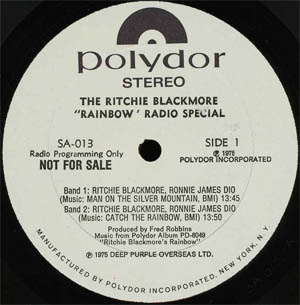 Note to DJ's and Program Directors: Here's exciting programming from Polydor Records... the RITCHIE BLACKMORE "RAINBOW RADIO SPECIAL!"
Note to DJ's and Program Directors: Here's exciting programming from Polydor Records... the RITCHIE BLACKMORE "RAINBOW RADIO SPECIAL!"Ritchie Blackmore's Rainbow is a totally new horizon in music, one of the most eagerly anticipated releases for rock fans everywhere. This is the superb musician who was one of the founders and driving forces of the rock supergroup Deep Purple... and with this album, be's off on a new musical direction of his own... a completely new spectrum. For those who wondered how he could top a triumphant career with Deep Purple, which had already taken him to the elite ranks of international stardom, with 14 million albums sold worldwide, in one year - to explain it, here is the answer.... RAINBOW. This RAINBOW RADIO SPECIAL is a "Self Portrait" of Ritchie and Ronnie James Dio, the dynamic young vocalist whose work with the band, Elf, was so critically aclaimed, and who is now an integral part of the new group, along with drummer Cozy Powell. It's a revealing audiobiography in which you share their thoughts and feelings, and wit... and during which they play four tracks from the new "Rainbow" album, including three of their own songs. It's a completely flexible program, and can be used in segments or entirely, as your program time permits. Commercials may be inserted at the end of each segment, or news, etc, and pertinent ad lib remarks should be used to lead back in. Please note: "Rainbow" consists of Ritchie Blackmore, guitar; Ronnie James Dio, vocals, Cozy Powell, drums; Tony Carey, keyboards; Jimmy bain, bass. Please make your audience aware that these are the members of the group, since this interview was recorded before either Carey or Cozy Powell joined Blackmore's Rainbow. The rapport that exists musically between Ritchie and Ronnie is also here in their witty and sometimes outrageous rap... and shows the chemistry and warmth between them... two very talented guys who are part of a great group, RAINBOW. You'll enjoy this special, the talk as well as the music! 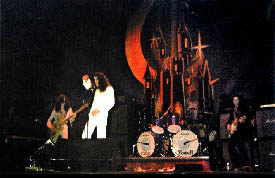 RB: Hello everybody, I'm Ritchie Blackmore, playing guitar for Rainbow.
RB: Hello everybody, I'm Ritchie Blackmore, playing guitar for Rainbow. RJD: Hello everybody, I'm Ronnie James Dio, singing for the same band, Rainbow. RB: The band originated, we frequent a club in Los Angeles called Rainbow, it's a nightclub where you can have a keg of beer and a night of wickedness at the first order. We got drunk one night and said let's have a band called Rainbow, so this is how it started. And then onwards I, me, myself happen to talk to Ronnie James Dio and say "do you want to record a particular track?". In the beginning we didn't have a LP in mind, it was just a single at first and this was "Black Sheep Of The Family" which a lot of people have said since: "you recorded that because you are the black sheep of the family with Deep Purple". I never really thought of it that way but since they've mentioned it I suppose I was. Then onwards I ask Ronnie and he said he'ld do the track. It turned out so well that we needed a b-side. We put the b-side down which turned out to be much better than the a-side, we thought: well, maybe we should do a LP about the whole thing. So we did the LP and it turned out so well, I was really excited about the whole thing so I contacted these hooligans I said: "Ronnie James Dio let's form a band". We got the band together and it's now on the road. Since I left Deep Purple, I left Deep Purple about 5 months ago after their last European tour, we were indulging in mad orgies and drinking ourselves under the table in general, which is what most people do in the Rainbow but it's a very nice club. RJD: We were different organisations at the time, I was in a band called Elf, Ritchie was with Deep... eh Deep someone, eh... now careful, it's a colour..... RB: Deep Pimple. RJD: That's it Deep Pimple. Ritchie decided to take a bit of a holiday from everything, from life, he needed someone to worry with him (Ritchie laughs in the background), so I started to worry with him. What happened is we splitted from our bands to get together and formed Rainbow, from the bar with the same name. RB: Ronnie to me, he has an incredible voice, he's very good at improvising. I found this was lacking in my former bands. I met Ronnie about three years ago and Elf was the name of the band he was in. He used to be support Deep Purple on most of the gigs because.... RJD: We do know all why, because you can't support yourselves RB: Right, he's very right. They were a very, very good band and we liked them very much plus being very nice people. But I've changed my mind about that as I found out they're right nasty. I took about three years before Ronnie and I spoke to each other because we use to give each other the eye. And he said to me one night "what are your doing?". And I told him I'm off to the Rainbow so he said "ok, I'll join you down there" and that's how we got together. RJD: He has the talent and think it was quite humerous, a big joke. It was never funny to me at all, I wanted to make sure everybody to know it was very serious between us. RB: We're good friends right now. RJD: So I'm now best friends with Ritchie Blackmore. Let's get to some music: first track is a song called "Man on the silver mountain", it's written by Ritchie and I. I've Ritchie explained this but you completely got lost so I'll do this for you (Ritchie laughs). It's a kind of semi-religious song, in the respect that the man on the silver mountain is the kinda God figure that everyone is crying out to, save them, help them and give them money, chicks and booze, and curious from diseases and all that. And they just basicly cry out to him, the man on the silver mountain to come down, make them holy and rewarding. That's the man on the silver mountain. RB: This particular LP was made in München, in Germany, and we recorded there because of the nightlife basicly, my favorite country is Deutschland and it always will be. I've spent several years there and that's why I particulary like the studio. It's a very good studio too. RB: When we formed Rainbow, Ronnie and I had the same interest in music which were basicly medieval classical roots such as Bach, actually the whole LP was inspired by Johan, who was there some of the time. And a lot of the progressions we used were classical progressions. That's not as drastic as it sounds, they're still rock progressions because I believe that Bach even in the 16th century was still playing in a way that was very relative to the way that people are playing today. Which is very rhythmical And we both had the same interest so we tried to incorporate these medieval parts... We used a lot of modes instead of scales. And modes meant we used weird chords. But we found out it worked with a rock backing. We achieved this on about four tracks. And I'm very excited about it because I never done this before and it turned out it very well. RJD: Rainbow has it's greatest influence from Ritchie (Ritchie yell and applaud). The greatest influence will be myself proberly (laughs), our greatest influence will be definitely Ritchie. Ritchie's guitarplaying, sense of rhythm, all of the qualities that I always have missed in working with a musician of Ritchie's caliber. What we eventually blended together was the writing of Ritchie and myself. My singing was the way he writes, the way he plays guitar, his possible playing guitar after the way I sing (Ritchie laughs) and ofcourse his long eyelashes. I don't know if we could say consciously we took anyone's influence. I can only sing, tell you who I enjoy listening to. 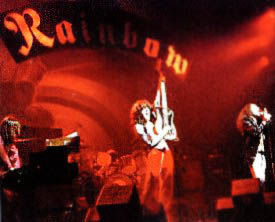 Not only listening to but who I am unconsciously influenced by the Beatles certainly. Any musician will be forced to say that they're at least be a bit influenced by the Beatles. The effects, the techniques they used something so inovated that now we say why didn't we think of that. We didn't think of it, they did so that was proberly one of my biggest influences. Being a vocalist I only can talk about vocal influences, I assume Ritchie will carry on about his instrumental influences, I try to listen to a wide range of vocalists. Steal whatever I can from them, whatever I'm capable of stealing and incorporated it in my own style.
Not only listening to but who I am unconsciously influenced by the Beatles certainly. Any musician will be forced to say that they're at least be a bit influenced by the Beatles. The effects, the techniques they used something so inovated that now we say why didn't we think of that. We didn't think of it, they did so that was proberly one of my biggest influences. Being a vocalist I only can talk about vocal influences, I assume Ritchie will carry on about his instrumental influences, I try to listen to a wide range of vocalists. Steal whatever I can from them, whatever I'm capable of stealing and incorporated it in my own style.RB: Why I am so interested in medieval stuff is because my hobby is phsycic research and I believe in supernatural and reincarnation. It creeps in and I think that I was around in the maybe 16th century, I'm so, in fact I'm positive I was around (Ronnie in the background "You still are", Ritchie laughs). As far as influences go I was raised with Les Paul, he was the first guitarist. He came round in about 1952 with Les Paul Marry Ford and he was the first guitarist playing with multi-echo and synchronise guitars, speeding up guitars. I think he was the first guitarist upon the scene electric guitar talk. I know there was Charley Christian who was the first electric guitarist. There's also Django Rheinhard, who taking taxi cabs from Paris to Lyon which cost him about £ 500 and he was often hiding in woods as a gypsy. I knew him very well, but my main influences from after Les Paul was the Beatles, again. Paul McCartney is a genious and up to this day I like Jethro Tull very much. You don't agree on the sound, you just let it happen. If it happens, it happens, if it doesn't, it doesn't. It happened and we were very excited about the sound we had. It's nothing drastically different from anything else but it has that flavour of the medieval touch which we wanted from the beginning so I'm very happy about that. RJD: A perfect example of that is a track called "Catch the Rainbow", it's lyrically medieval in that, eh... it's concerning a stableboy who, eh lucky guy, make a way to the lady of the courts, kinda upperclass. She sneakes off to his little stable and sleeps on his strawbed every night and they think it's all gonna work but as we rudely find out it never does. And they kinda go there own way. This is the track that I think both Ritchie and I are very proud of. "Catch the Rainbow" is our idea of the futility of man versus woman I think, quite a representative track from what we're try to give you. 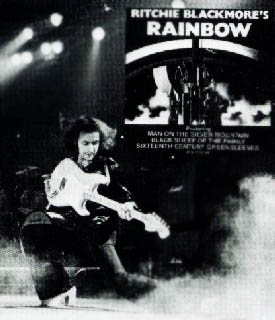 RB: There are five guys in the group, organ, bass, guitar, drums, what do you do Ron?
RB: There are five guys in the group, organ, bass, guitar, drums, what do you do Ron?RJD: Drums, organ, guitar and ocassionally I produce every album by Rainbow. RB: Can we have somebody who sings? RJD: Not at the moment. RB: What do you do? You sang on the LP, didn't you? RJD: No I didn't, that was Robert. RB: Robert? RJD: Yes! RB: No, Ronnie James Dio on vocals. We have Mickey Lee Soule on keyboards, who doesn't know what he's doing. That's a joke, which is not very funny. On drums we have Gary Driscoll, he used to be a ballet dancer, which has nothing to do with what I'm talking about. RB: On bassguitar we have a number of people at the moment (laughs), his name is Jimmy Bain. Jimmy Bain who's a Scotsman on bass. There was also some guests that came in now and again. There was the vicar, we used to go round blessing people. We're very religious. And there was wasp buzzing around, there was the eagle, the shark. And also there was Shashana on vocals, Hughie McDowell came in when he wanted a drink and he used to play cello. RJD: I just want to mention how difficult it is to get people who'll play in other bands together, to match personalities, to match musical taste, to be sure that everyone is happy. Right that's it, Ritchie is, if this was on video you'ld see it, there was the old fist in the palm because that's the way to do it. A whip across the back and no other way. We found that kinda working socially first makes it feel easier going in the studio. If you like each other you can play good likeable music (Ritchie laughs), if you don't like each other you play very bad music. I guess there are some people play good music who didn't like each other, but anyway. There wasn't really much of birth pain going on. It's very easy to be established first, when you've got a Ritchie Blackmore on your side and especially when you have a Ronnie James Dio on your side, all the other musicians.... RB: Picks his nose by the way, tell them that. RJD: I won't tell them. RB: Warn them. RJD: But I wanna mention the other people in the band, Gary Driscoll drummer, Jimmy Bain the bassplayer, keyboardman Mickey Lee Soule. It's a kinda of a family affair cause we get along socially, we like each others friends and, now wait a minute, there's one friend of Ritchie that I can't handle at all. We basically have the same likes, the same dislikes which make all of it very easy. We really didn't have to worry too much of being on the road because all we have done so far is the recording the LP, we haven't been on the road touring yet but we will be very, very shortly. At the moment we getting to know each other more from musically as far as rehearsals go. As far as anything else goes I'm bored and I don't care. RB: There are very many rockbands in the market today, reverting back to Deep Purple, the pressure was very hard with Deep Purple because they were so big and we had to release three LP's a year, tour the world. With this band we're trying to be a lot more mellow and we are contracted to do one LP a year which is what I wanted. I want to lay on the beach and be lazy. I know there's a lot of competition but people know what they like and the music we're making is something that I like very much. I could have carried on in Deep Purple and sat back. Another door, another day or is it the other way around. It's the other way around but I'm very excited about it because I'm playing music that I want to in the time that I want to play in as much as I'm not pressured anymore as much as I was. This was what I was try to get away from. A lot of people say "why did you leave Deep Purple?". It's because there was too much pressure and I'll never let that happen again. Same kind of success would be nice but not the same pressure. RJD: Great success without the pressure can certainly be handled. We're gonna prove that for sure. The basis of this band was originally to make music, that's a statement made by everyone, we wanna make music and we don't care about anything else. We don't care about the stage sets. And we don't care about how to compete with anybody else. The purest idea is we wanna make music we wanna people who listen to it, who buy it, to enjoy it without all the contrivances going on. We realise that we need to have a stage set that can compete with anyone else. We have to have our sound system that can compete with anyone else. We have to have musicians that can compete with anyone else. We feel we have all of these but we don't want to become theater. We would really like to retain the idea music first, theater kinda if as a support act to the band, the theatrics will compete enough competitive enough so that we will be able to play the music. RB: I think theatrics are very entertaining, if the music is bad, or in our case the music is gonna be terrible (laughs), I like theatrics to a point, especially Jethro Tull, he uses theatrics very nicely, he is very musical and he uses a touch of theatrics which I think is very good. I'm not too sure about the Alice Coopers and the Rolling Stones, the way they have to use them I don't think they would obtain an audience if they didn't get up to some Tom Foolery as we say back in England, like as mirrors reflecting the audience so they can see themselves. I like theatrics to a certain extense but as long as it doesn't overshadow the music. RJD: It's time to introduce another track, don't you think. This song has no theatrics, no thrills, no fancy parts. This is an instrumental song, called "Still I'm Sad", which is an old Gregorian champ, again going back to the medieval. RB: Not medieval, 13th century. RJD: Well, it may be 13th century to you but to me it's mama. He's right about that, medieval is not what this is but it's ancient history with kinda coinsise a little bit anyway it's a Gregorian champ done by the Yardbirds at one point with a kinda new rendition. And here's a new rendition of that old favorite. RB: Going back to my earlier child-youth I was abandonned at a station, Charing Cross Road, at the very early age of 25. No, I picked up the guitar when I was eleven. Started seriously classical studies when I was twelve. Carried on classical till I was 15. After I was 15 my job was a radio mechanic working with aircrafts. After a year of that I realised the guitar was my life. Then I picked up the guitar again, because I left it alone for about a year. Then I started studying seriously, playing just rock and roll. An old guitarteacher of mine once said to me whatever guitarplaying you're gonna take up make sure it's one type of guitarplaying so I decided upon to play the rock'n'roll guitar Maybe because of the glamour, but rock'n'roll to me was very demanding, very challinging, cause it was very limiting and that's why I took up the rock'n'roll guitar. So since I was 15 years, 16 years old I've been playing rock'n'roll guitar. RJD: I started my own interest of music by listen to the radio, my parents would turn it on in the morning after their daily toil, getting myself ready for school, hearing what they used to play, it certainly wasn't rock'n'roll, big band things, not old enough already to know. They use to tape all the radio programs for me Harry James, Benny Goodman and people like that. This was in New York, I'm in aid of a New Yorker, not New York City but upstate New York. And from that early influence, just listening to the big band thing. In those days it was kinda boogie music actually. The form of the boogie you hear now. My father one day said to me: "Right, how would you play an instrument". What's that, I want to play ball, I didn't care about playing an instrument. "Well, if you hear something you like on the radio, pick it up and let me know". Luckily I didn't, there was no tuba piece sound at that moment, it was Harry James, that sounds good what do you call that thing. My father, being the brilliant musical intellect that he was said "I don't know I call someone for you" (Ritchie laughs), so he did and found out that Harry James played clarinet, oh no sorry, even I forgot, Harry James was a trumpet player. My father said I pick you up a trumpet tomorrow when I'm going to the pawn shop. So he happens to pass the pawn shop. RB: Is it relative to pornographic? RJD: Yes, it's relative to pornographic. I was a very pornographic trumpet player. He picked me up a horn and I played it for a while and that was my early classical training. I played in orchestras with violins, cellos, violas, bassoons and timpani and all of that instead of guitars. I had many, many formal lessons. I was at one point going to Juilliard, had a scholarship to Juilliard for playing trumpet but in that interum between having a chance to go to Juilliard and doing what I like to do. One day I heard a band that had trumpets. The trumpetplayers stand up and sang Hound dog. That's what it had, there it started. Hound dog is the thing, i don't care what trumpetplayer or whatever he is and I still can remember that first thing hearing that person doing it. No more trumpet, I'm gonna do something else, I picked up a guitar, learn to play it a bit, not very well at all, still don't but there was at least a rock'n'roll influence. From there my whole life was channeled to volume music. Hard inside your stomach, guts music instead of Harry James. RJD: The track that most examplifies the medieval music that we've been talking about is a song called "16th Century Greensleeves", inspired by Elvis Presley, written by Judy Garland. RB: Robin Hood! 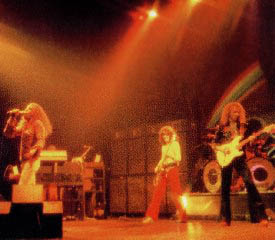 RJD: I'm sorry, written by Robin Hood, but we are taking publishing on whatever Robin Hood has been written since then. Anyway the song is our idea of a castle where the black knight lives. The black knight ofcourse being Ritchie and the black knight periodically comes out of his castle and captures a young peasant maiden from the village where they're all living in squalid, brings her back to the castle. Very, very rude. And he does this over the period of 15 or 20 years, I haven't sorted that out yet. Finally one day the peasants say: "Wrong, you're taking the wrong chick. This is the chick that's going to save the village. We're going to take revolt against you."
RJD: I'm sorry, written by Robin Hood, but we are taking publishing on whatever Robin Hood has been written since then. Anyway the song is our idea of a castle where the black knight lives. The black knight ofcourse being Ritchie and the black knight periodically comes out of his castle and captures a young peasant maiden from the village where they're all living in squalid, brings her back to the castle. Very, very rude. And he does this over the period of 15 or 20 years, I haven't sorted that out yet. Finally one day the peasants say: "Wrong, you're taking the wrong chick. This is the chick that's going to save the village. We're going to take revolt against you."RB: Why is she gonna save the village? RJD: She's going to save the village because she has eleven fingers on one hand (Ritchie laughs). No, this obviously becomes the portent of fast capability so in order to save those eleven fingers on one hand, by the way she doesn't have a left hand, eleven on her right hand and she only has nine toes. Which means that it all comes back to have only twenty digitals (Ritchie laughs again). So in that case seeming that she's all that fold up. They decide to revolt against the black knight and they cut down the castle, eh... they cut down the drawbridge (Ritchie keeps laughing). They would cut down the castle if they had a sharp knife. Actually they attack the castle or as they say in Hounslow the caastle (posh accent). They attack the castle and they cut down the drawbridge and they hang up the black knight right by his (Ritchie laughs)... left thumb. And then they put him in the fire and they take over the village. The best what they kinda comes down to it. We had quite a change from the 16th century to now, the 20th century. We're all very, very free people. Able to do with our money what we wanna do and with our lifes what we wanna do and if you believe that anyone out there you are... wrong, wrong and wrong (Ritchie laughs loud). The point is that this is a song called "16th Century Greensleeves", and the music will convate to you that medieval was our intent and our concept and we hope that it's a new kind of rock'n'roll music anyway. It's something that we like a lot. RB: It's only 400 years old |
